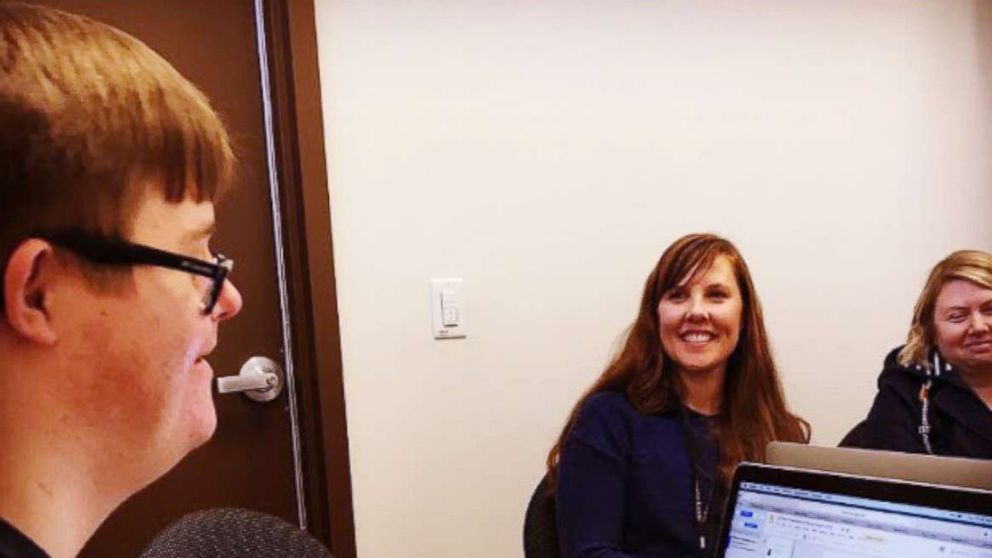


[Editor's note: As the school year starts to wind down, parents all over the country will find themselves in meetings about the Individualized Education Plan, or IEP, for their children with special learning needs. As Beth Foraker and her 18-year-old son, Patrick, attended their last of these meetings, she reflects on the years passed and how far Patrick, with the help of some exceptional educators along the way, has come. Patrick, born with Down syndrome, heads to a college program in the fall.]
IEPs suck.
There's no other way around it.
I've thought about this a lot ... having been through many, many, many.
It feels like we could make them easier on the mama's heart. We could just stop talking about all of the many ways the student isn't measuring up and start considering the one-of-a-kind, unrepeatable gifts they bring to the class.
Why must we test and test and test... using measurement tools that have not been created for people with intellectual disabilities at all?
I'm pretty sure I would fail a test in Chinese ... it wasn't made for me.
Why do we force kids with Down Syndrome to take tests that weren't made for them and then act surprised when the scores reveal that the test wasn't made for them?
Why do we make educating children so hard?
Why do we sit as a panel of experts judging, critiquing, analyzing ... while the parent waits with dread at the guilty verdict: We pronounce your child disabled.
Why do we see disability as brokenness?
Why can't we see the rare gift of the individual?
Before Patrick, I would have been bothered by that bold white poppy.
I would have disgustedly thought it should fit in.
Its difference would annoy me.
Today I see that poppy and cheer ... or, in this case, stop and take a pic.
You, Go, white poppy!
How did you become white? Aren't you your bad self, standing there so bold and defiant.
Best of all, I marvel at the environment. Somehow, some way, the circumstances were configured so that this white poppy could bloom ... alongside the orange ones.
How can we help our classrooms be like that?
What does it take?
It sure doesn't take a panel of poppies sitting around a table pointing out the whiteness... or should we say "severe lack of orange-ness" ... the deficit in orange is noticeable.
Spoiler alert: it's never becoming orange.
And, yet, it is beautiful and capable of being a white poppy perfectly and needs no panel of experts telling it what to do.
*****
I propose this for the next IEP you must attend:
Ask them to tell you about your white poppy. Ask them to SEE the beauty in your white poppy. Ask them to understand that the white poppy is never never turning orange and yet it must live among the orange bounty.
What can they do to ensure the vibrancy and flourishing of the white poppy among so many orange ones?
Let's just start by valuing the white poppy.
Let's stop trying to make the white poppy anything else.
Let's just notice the beauty...and work to fertilize the soil and water it enough and offer sunlight.
*****
Today, we reached the end of a long long journey. No more IEPs and panels and tests.
I can hardly believe it.
Patrick's journey through kindergarten to high school is almost complete. Because Patrick is graduating with a high school diploma, he will have no transition services from 18 -21.
Somehow, miraculously, my white poppy has been able to grow/thrive/learn/live with all the orange poppies.
Yes, there were people who thought that my white poppy didn't belong... but there were way, way more gardeners who saw his unusual beauty and created the climate for him to thrive.
I am so grateful to the teachers who said yes. So grateful for the willing hearts. So humbled by the gift of educators who found a way to welcome a white poppy into an orange world.
Today, my 18 year old son with Down syndrome signed his own damn IEP.
He shared his hopes and dreams - his strengths and his struggles. He offered his vision for his future to a bunch of adults. He acknowledged his heroes and dreamed out loud.
I sincerely doubt if I could have done anything close to that when I was 18.
It was a crystal clear moment of courage and clarity.
I was sidelined and in the cheering section... as it should be.
*****
Believe in your child so much the world thinks you're crazy. Then believe more.
The problem isn't that we dream too big... I know that much.
Today, I am grateful for the grace of endings, the blessing of beginnings and the power of prayer. Lord, hold him close.
Beth Foraker is a mother, educator and advocate. She is the founder of the National Catholic Board on Full Inclusion and writes at Grace in the Ordinary.